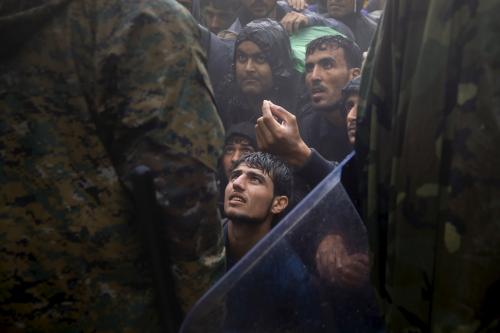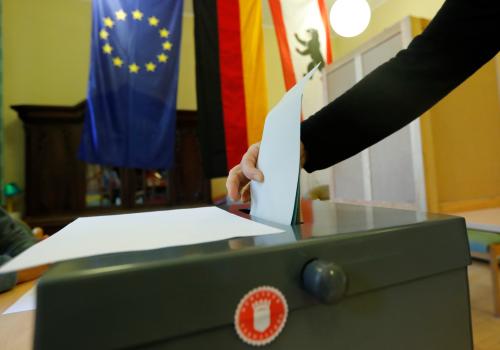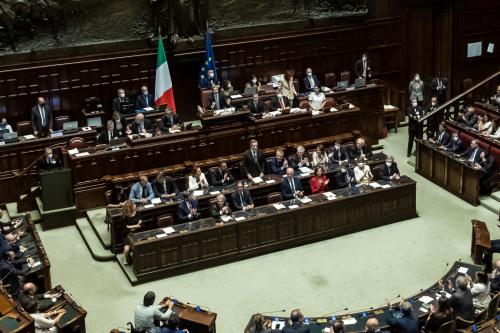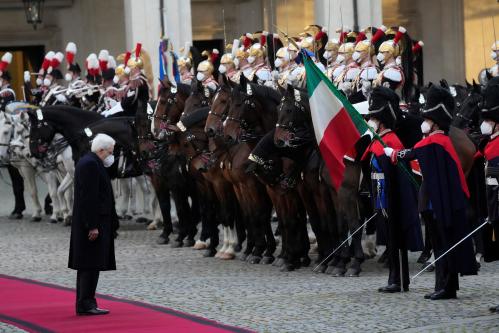According to the current projections, after the European Parliament elections this weekend Italy might find itself excluded from Europe’s decisionmaking. A sense of marginalization and distance from the EU might grow in Italy’s public opinion, with hard-to-fathom political consequences.
Both parties forming the current government coalition—the League and the Five Star Movement (M5S)—are likely to gain a significant number of seats. The League is expected to become the second largest national party represented in the European Parliament, after the German Christian Democratic Union (CDU), while M5S could double its number of seats.
However, neither belongs to any of the parliamentary groups that will probably form the majority in the next European parliament. On one hand, German Chancellor Angela Merkel recently spoke against the possibility of an alliance between the European Popular Party (EPP) and the League. On the other hand, the sovereigntist front—to which both the League and the M5S belong—is divided over the distribution of refugee quotas, Europe’s approach to Russia and China, and other issues. Eventually, the majority of Italy’s members of the European Parliament (MEPs) might find themselves at the margin of Europe’s decisions.
This is quite unusual in Italy’s political history. In the past, Italy’s ruling parties have always abundantly filled the ranks of the two largest European families—the EPP and the Progressive Alliance of Socialists and Democrats (S&D)—that have regularly formed large coalitions leading the European Parliament’s work. The next European Parliament majority might need a coalition that is enlarged to the liberal Alliance of Liberals and Democrats for Europe (ALDE) and/or the Greens. Consequently, only Italy’s two major opposition parties, the Democratic Party (PD) and Forza Italia, might find a role, albeit reduced, in the EU’s parliamentary majority.
This exclusion from the parliamentary majority has particular impact in a body like the European Parliament, because it means a lack of influence in choosing the heads of parliamentary commissions, where decisionmaking takes place. Most importantly, Italy’s political marginalization implies that Rome might not have a say in the nomination of high-level officials of EU institutions. At the moment, Italy can count on at least four high-level representatives: Mario Draghi at the European Central Bank, Antonio Tajani and Fabio Massimo Castaldo at the presidency and vice presidency of the European Parliament, and Federica Mogherini as high representative for foreign affairs and security policy. But this will surely not be the case when these posts get renewed. After Sunday’s vote, Italy’s presence in high-level EU posts might be reduced to a commissioner of lesser relevance, while the only top-level official will be Andrea Enria at the helm of the European Central Bank’s Banking Supervision.
On the domestic level, these dynamics risk provoking a deeper fracture between Italian politics and Italian public opinion towards EU politics and institutions. Over the years, Italians have become more and more resentful towards the European Union as a consequence of Italy’s poor economic conditions and the migration crisis. Not being able to influence European politics will increase a sense of victimization that sovereigntists and populists could easily exploit, pointing to the fact that they may be excluded from EU institutions even if they perform well at the polls. Ultimately, they could claim that the EU institutions themselves lack democratic legitimacy if they fail to reflect Italy’s popular vote. This would make it all the more likely that an anti-EU campaign could appear during the next parliamentary elections.
The controversial foreign policy and the confrontational approach that the Italian coalition government has adopted towards the European Union do not set the ground for good cooperation between Rome and Brussels in the coming months. On the contrary, the negotiations on fiscal policy with the European Commission and the disputes over the handling of the migration crisis feed into a powerful populist narrative that resonates in Italian public opinion.
The more confrontational and isolated Italy gets from EU’s institutions, the more difficult it will become to find consensual and balanced solutions. Meanwhile, Europe will appear ever less appealing to Italians.
The Brookings Institution is committed to quality, independence, and impact.
We are supported by a diverse array of funders. In line with our values and policies, each Brookings publication represents the sole views of its author(s).









Commentary
Europe votes: How populist Italy is missing out
May 24, 2019